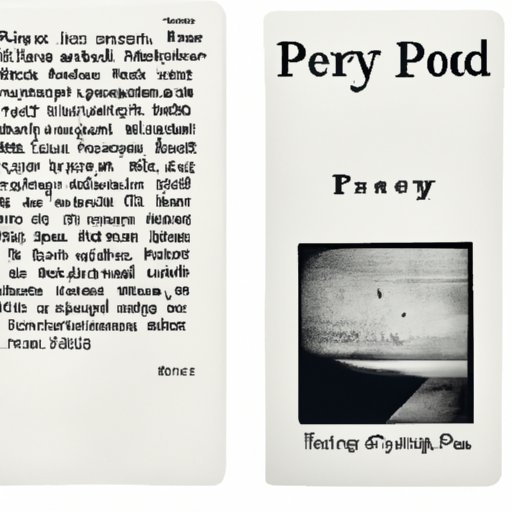Introduction
Modernist poetry is a literary movement that emerged in the early 20th century and is known for its experimentation with language, form, and subject matter. Modernists poets sought to break away from traditional styles of poetry and express themselves in new and innovative ways. This article will explore the social, cultural, and political realities that led to the development of modernist poetry and the impact of the movement on literature.
Analyzing the Social, Cultural, and Political Background of the Modernist Movement
The modernist movement emerged in the aftermath of the Industrial Revolution, which saw significant changes in technology, transportation, and urbanization. This era was marked by a sense of disillusionment, fragmentation, and uncertainty. As traditional norms and values were challenged, modernist poets sought to express the chaos and confusion of the times through their writing.
Moreover, advancements in the sciences and the rise of psychology and psychoanalysis also influenced modernist poetry. Many poets sought to represent the inner workings of the human mind, exploring themes of consciousness, perception, and identity.
The Impact of World War I on Modernist Poets
The experience of World War I had a profound impact on modernist poets. They were confronted with the horrors of war, and many were disillusioned with the idea of progress and disillusioned with the values of the past.
Many modernist poets rejected the conventional forms of expression in favor of new ways to convey trauma and chaos. They experimented with fragmented language, unconventional syntax, and variable meter to capture the disorientation of the times.
Themes of isolation, alienation, and despair also became prominent in modernist poetry. Poets sought to express the psychological trauma of war and the sense of fragmentation and disillusionment that followed.
The Role of Avant-garde Movements in Shaping Modernist Poetry
Avant-garde movements like Cubism, Futurism, and Surrealism were instrumental in shaping modernist poetry. These movements valued experimentation and innovation and sought to challenge traditional forms and techniques. They called upon artists and writers to abandon traditional norms and explore new avenues of expression.
Many modernist poets were influenced by the visual arts and sought to bring the principles of modernism to literature. They experimented with visual imagery, collage, and fragmentation to create new forms and techniques.
Tracing the Evolution of Modernist Poetry
Modernist poetry has its roots in the Romantic era. Romantic poets sought to express their innermost feelings and emotions and rejected the rules of formal poetry. They valued personal liberty and self-expression, and this values inspired later modernist poets to explore new styles and techniques.
Modernist poets sought to redefine poetry in response to changing literary tastes and cultural shifts. They experimented with free verse, variable meter, and unconventional syntax to break away from traditional forms and challenge the reader’s expectations.
Investigating the Influence of Diverse Literary and Artistic Movements
Movements like imagism and symbolism contributed to the development of modern poetry. Imagists poets like Ezra Pound and William Carlos Williams sought to express themselves in concise and direct language, experimenting with visual imagery and vivid description.
Symbolism emerged in France in the late 19th century and focused on the use of symbols and metaphors to explore the mysteries of the subconscious. Symbolist poets sought to reveal hidden meanings and explore the inner workings of the human mind. The influence of symbolism can be seen in the works of T.S. Eliot and Wallace Stevens.
Analyzing Individual Modernist Poets
T.S. Eliot, Ezra Pound, and Gertrude Stein are among the most significant modernist poets. Eliot’s “The Waste Land” is often cited as a landmark poem of the modernist era and explores themes of fragmentation, disillusionment, and despair. Pound was known for his experiments with language, and his “Cantos” reflect a wide range of influences and styles. Stein’s writing was characterized by a playful use of language, and her works challenged the conventions of traditional storytelling.
Conclusion
The development of modernist poetry was shaped by a variety of social, cultural, and political factors. Modernist poets sought to express the chaos and confusion of the times in new and innovative ways. They experimented with language, form, and subject matter to challenge the reader’s expectations and redefine poetry. The movement had a lasting impact on literature and continues to inspire writers today.
